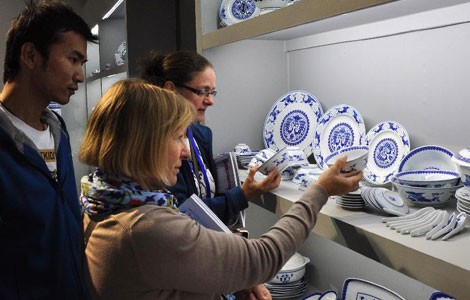It pays to pay attention to details
Updated: 2013-10-21 07:11
By Hong Liang (China Daily)
|
||||||||
At an informal gathering in the Shanghai office, a visitor from Beijing wondered aloud why a humble bowl of plain noodles he had the night before tasted so good. All the learned editors and bright young reporters in the room were at a loss for an answer.
Indeed, the question may sound casual. But a bowl of plain noodles, lovingly called yangchun, or "sunshine of early spring", is anything but casual to people in this region.
Connoisseurs and food critics professed that there is art in this deceptively simple fare. It's often likened to a particular style of Chinese water painting that follows the rule of simplicity to the extreme. In the hand of a Zen maestro, a few brush strokes in black ink, it is said, can convey a meaning as deep as the mind can fathom.
Of course, most diners aren't that philosophical when it comes to eating. But you really need to have to cultivate a taste of simplicity to truly appreciate a bowl of needles garnished by nothing more than a sprinkle of chopped spring onions.
The secret of good-tasting yangchun noodles, food critics agree, is in the soup. None of the canned varieties will do. Every master cook has his own closely guarded formulas distilled from many years of experience in the culinary art. But there are common ingredients, such as chicken, lean pork, bones, Chinese ham and a variety of herbs.
Legend has it that discerning diners can tell the age of the chicken used in the soup by taste. Older chickens raised in open farms where they can roam free are best because their sinuous flesh lends a stronger flavor to the soup.
But stronger doesn't necessarily mean better. The flavor of the soup must not be allowed to overpower the refreshing taste of wheat in the noodles.
This all sounds like much ado about nothing. If you think so, you probably don't know what you missed.
We are not talking about the meaning of culinary art or similar lofty subjects. Let's talk about making money.
Zhejiang province, as we all know, is a low-cost manufacturing center, producing trillions of yuan in goods for export around the world. This model of economic growth is hit by rising labor and land costs, which have slashed manufacturers' profit margins to the bone.
There has been much talk about industrial restructuring, but little real progress has been made. There might be something that the entrepreneurs producing shoes, clothing and accessories can learn from the master Zhejiang chefs who demand nothing less than perfection even when cooking a bowl of yangchun noodles. It's the undivided attention to detail, irrespective of how laborious the process is, that distinguishes them from the common cooks.
It doesn't cost much to serve a bowl of plain noodles. But it is the yardstick by which many eateries are judged. Diners here believe that a restaurant that serves a decent bowl of plain noodles can be trusted to do other dishes right. That trust is a valuable asset that allows the restaurant owner to charge a premium.
There is really nothing high-tech special about the iPhone, for instance. It's the attention to detail that sells.
(China Daily 10/21/2013 page8)
Most Viewed
Editor's Picks

|

|

|

|

|

|
Today's Top News
Life of Pi artwork on display
No criminal charges in Asiana crash death: DA
Extradition deal with US key to nabbing fugitives
Seattle high-tech summit talks 'green'
JPMorgan reaches $13b deal
Li urges greater effort on reforms
Canada welcomes China to invest
Australian authorities fear worsening wildfires
US Weekly

|

|















